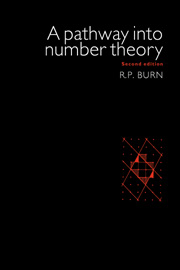Book contents
- Frontmatter
- Contents
- Preface to the second edition
- Introduction
- 1 The fundamental theorem of arithmetic
- 2 Modular addition and Euler's ɸ function
- 3 Modular multiplication
- 4 Quadratic residues
- 5 The equation xn + yn = zn, for n = 2, 3, 4
- 6 Sums of squares
- 7 Partitions
- 8 Quadratic forms
- 9 Geometry of numbers
- 10 Continued fractions
- 11 Approximation of irrationals by rationals
- Bibliography
- Index
5 - The equation xn + yn = zn, for n = 2, 3, 4
Published online by Cambridge University Press: 05 June 2012
- Frontmatter
- Contents
- Preface to the second edition
- Introduction
- 1 The fundamental theorem of arithmetic
- 2 Modular addition and Euler's ɸ function
- 3 Modular multiplication
- 4 Quadratic residues
- 5 The equation xn + yn = zn, for n = 2, 3, 4
- 6 Sums of squares
- 7 Partitions
- 8 Quadratic forms
- 9 Geometry of numbers
- 10 Continued fractions
- 11 Approximation of irrationals by rationals
- Bibliography
- Index
Summary
The equation x2+y2 = z2
1 Table 5.1 is a table of sums of squares. Using the left hand column of squares as a checklist, determine the location of all the square numbers in the table. The only square which appears that is greater than 2500 is 2704.
2 What are the square numbers which appear in table 5.1 along a line joining 0 to 42 + 32 = 52? Given the first of these could you have predicted the others?
3 What are the square numbers which appear along a line joining 0 to 122 + 52 = 132? What is the similarity between them?
4 Use the fact that 242 + 72 = 252 and 152 + 82= 172 to predict two more square numbers in table 5.1.
5 If x, y and z are positive integers such that x2 + y2 = z2, then (x, y, z) is called a Pythagorean triple. If, moreover, gcd (x, y, z) = 1, then (x, y, z) is called a primitive Pythagorean triple. Identify the seven distinct primitive Pythagorean triples which may be deduced from table 5.1, ignoring the possibility that (x, y, z) ≠ (y,x,z).
6 If (x, y, z) is a Pythagorean triple, is it possible that
(i) all three of JC, y and z are even,
(ii) just two of JC, y and z are even,
(iii) just one of JC, y and z is even,
(iv) neither JC, nor y nor z is even?
Either illustrate the possibility, or prove the impossibility.
The equation x2 +y2 = z2
7 If (JC, y, z) is a Pythagorean triple, is it possible that
(i) all three of JC, y and z are divisible by 3,
(ii) just two of JC, y and z are divisible by 3,
(iii) just one of JC, y and z is divisible by 3,
(iv) neither JC, nor y nor z is divisible by 3?
Either illustrate the possibility, or prove the impossibility. For
(iv), make a table of sums of squares in Z3.
- Type
- Chapter
- Information
- A Pathway Into Number Theory , pp. 97 - 118Publisher: Cambridge University PressPrint publication year: 1996

